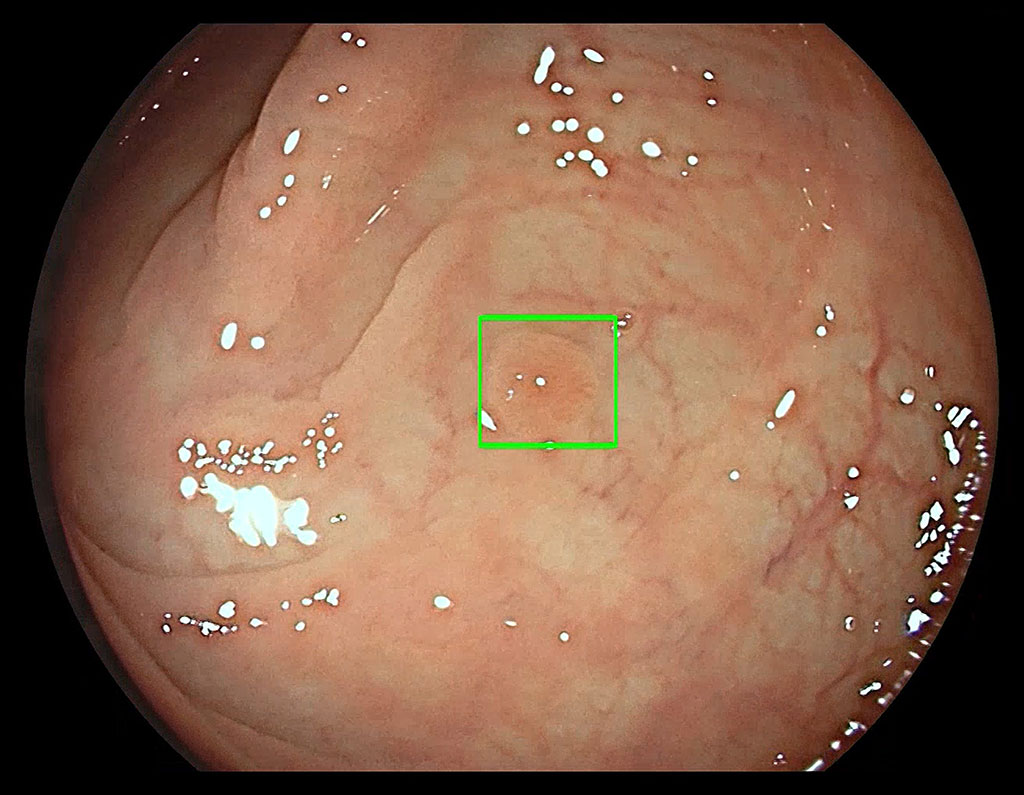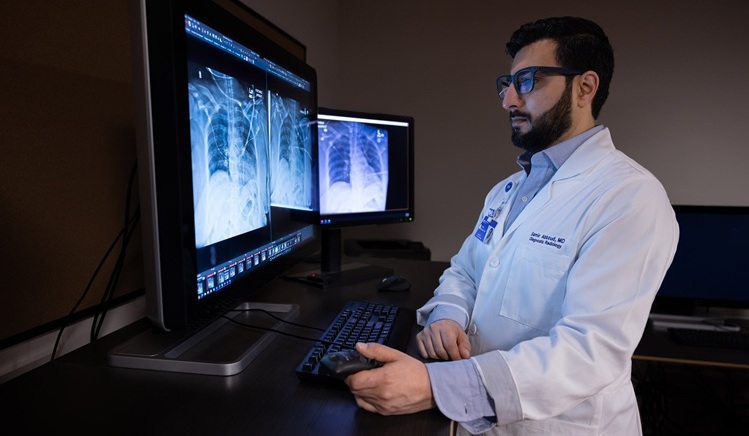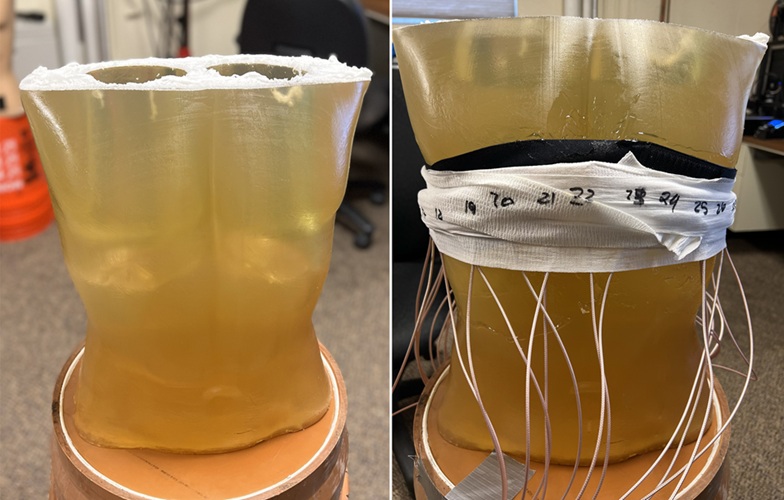Intelligent Endoscopy Module Detects Pre-Cancerous Growths
|
By MedImaging International staff writers Posted on 26 Apr 2021 |

Image: The GI Genius automatically identifies and marks (with a green box) colorectal polyps (Photo courtesy of Medtronic)
A novel computer-aided detection (CADe) system that is compatible with any colonoscope uses artificial intelligence (AI) to identify colorectal polyps.
The Medtronic (Dublin, Ireland) GI Genius module highlights the presence of precancerous lesions with a visual marker in real-time, serving as an ever vigilant second observer. It processes images using advanced AI algorithms that can identify and mark abnormalities consistent with polyps, including small flat polyps that might otherwise go undetected by the human eye. Developed by Cosmo Pharmaceuticals (Dublin, Ireland), the GI Genius intelligent endoscopy module is based on a unique proprietary library of high-definition lossless videos of colonoscopies and proprietary software and algorithms.
Clinical studies have shown that having a second observer can increase polyp detection rates, and every one percent increase in adenoma detection rate (ADR) reduces the risk of colorectal cancer (CRC) by three percent. By using the GI Genius module, a 14% absolute increase in ADR was measured (compared to colonoscopy alone) for both flat (42% increase) and polyploid (36% increase) lesions, substantially increasing colonoscopy accuracy and reducing the rise of interval cancers, which can occur between colonoscopies.
“Medtronic is committed to preventing colorectal cancer and improving patient outcomes with disruptive technologies that aid screening, increase patient compliance, and improve treatment," said Giovanni Di Napoli, president of the gastrointestinal business at Medtronic. “We expect to enhance and improve colonoscopies and polyp detection. By introducing AI technology into the colonoscopy market, we anticipate improving colonoscopy detection rates and reducing variability in patient outcomes.”
“Through the strong partnership with Medtronic over the last two years, Cosmo has expanded its position in the medical device market within its core GI expertise, has gained global access, and will ultimately reach more patients,” said Mauro Ajani, Chairman of Cosmo Pharmaceuticals. “We are extremely pleased and very optimistic about the impact the GI Genius intelligent endoscopy module will have on the US patient population undergoing colonoscopy.”
CRC is the second most common cause of cancer-related death both in Europe, killing over 215,000 Europeans every year, as well as in the United States, with an estimated 134,000 diagnoses and 49,000 deaths in 2016 alone. But despite compelling evidence that screening can detect CRC and precancerous polyps, nearly one-third of the recommended adult population has never been screened.
Related Links:
Medtronic
Cosmo Pharmaceuticals
The Medtronic (Dublin, Ireland) GI Genius module highlights the presence of precancerous lesions with a visual marker in real-time, serving as an ever vigilant second observer. It processes images using advanced AI algorithms that can identify and mark abnormalities consistent with polyps, including small flat polyps that might otherwise go undetected by the human eye. Developed by Cosmo Pharmaceuticals (Dublin, Ireland), the GI Genius intelligent endoscopy module is based on a unique proprietary library of high-definition lossless videos of colonoscopies and proprietary software and algorithms.
Clinical studies have shown that having a second observer can increase polyp detection rates, and every one percent increase in adenoma detection rate (ADR) reduces the risk of colorectal cancer (CRC) by three percent. By using the GI Genius module, a 14% absolute increase in ADR was measured (compared to colonoscopy alone) for both flat (42% increase) and polyploid (36% increase) lesions, substantially increasing colonoscopy accuracy and reducing the rise of interval cancers, which can occur between colonoscopies.
“Medtronic is committed to preventing colorectal cancer and improving patient outcomes with disruptive technologies that aid screening, increase patient compliance, and improve treatment," said Giovanni Di Napoli, president of the gastrointestinal business at Medtronic. “We expect to enhance and improve colonoscopies and polyp detection. By introducing AI technology into the colonoscopy market, we anticipate improving colonoscopy detection rates and reducing variability in patient outcomes.”
“Through the strong partnership with Medtronic over the last two years, Cosmo has expanded its position in the medical device market within its core GI expertise, has gained global access, and will ultimately reach more patients,” said Mauro Ajani, Chairman of Cosmo Pharmaceuticals. “We are extremely pleased and very optimistic about the impact the GI Genius intelligent endoscopy module will have on the US patient population undergoing colonoscopy.”
CRC is the second most common cause of cancer-related death both in Europe, killing over 215,000 Europeans every year, as well as in the United States, with an estimated 134,000 diagnoses and 49,000 deaths in 2016 alone. But despite compelling evidence that screening can detect CRC and precancerous polyps, nearly one-third of the recommended adult population has never been screened.
Related Links:
Medtronic
Cosmo Pharmaceuticals
Latest General/Advanced Imaging News
- CT Colonography Beats Stool DNA Testing for Colon Cancer Screening
- First-Of-Its-Kind Wearable Device Offers Revolutionary Alternative to CT Scans
- AI-Based CT Scan Analysis Predicts Early-Stage Kidney Damage Due to Cancer Treatments
- CT-Based Deep Learning-Driven Tool to Enhance Liver Cancer Diagnosis
- AI-Powered Imaging System Improves Lung Cancer Diagnosis
- AI Model Significantly Enhances Low-Dose CT Capabilities
- Ultra-Low Dose CT Aids Pneumonia Diagnosis in Immunocompromised Patients
- AI Reduces CT Lung Cancer Screening Workload by Almost 80%
- Cutting-Edge Technology Combines Light and Sound for Real-Time Stroke Monitoring
- AI System Detects Subtle Changes in Series of Medical Images Over Time
- New CT Scan Technique to Improve Prognosis and Treatments for Head and Neck Cancers
- World’s First Mobile Whole-Body CT Scanner to Provide Diagnostics at POC
- Comprehensive CT Scans Could Identify Atherosclerosis Among Lung Cancer Patients
- AI Improves Detection of Colorectal Cancer on Routine Abdominopelvic CT Scans
- Super-Resolution Technology Enhances Clinical Bone Imaging to Predict Osteoporotic Fracture Risk
- AI-Powered Abdomen Map Enables Early Cancer Detection
Channels
Radiography
view channel
AI Radiology Tool Identifies Life-Threatening Conditions in Milliseconds
Radiology is emerging as one of healthcare’s most pressing bottlenecks. By 2033, the U.S. could face a shortage of up to 42,000 radiologists, even as imaging volumes grow by 5% annually.... Read more
Machine Learning Algorithm Identifies Cardiovascular Risk from Routine Bone Density Scans
A new study published in the Journal of Bone and Mineral Research reveals that an automated machine learning program can predict the risk of cardiovascular events and falls or fractures by analyzing bone... Read more
AI Improves Early Detection of Interval Breast Cancers
Interval breast cancers, which occur between routine screenings, are easier to treat when detected earlier. Early detection can reduce the need for aggressive treatments and improve the chances of better outcomes.... Read more
World's Largest Class Single Crystal Diamond Radiation Detector Opens New Possibilities for Diagnostic Imaging
Diamonds possess ideal physical properties for radiation detection, such as exceptional thermal and chemical stability along with a quick response time. Made of carbon with an atomic number of six, diamonds... Read moreMRI
view channel
New MRI Technique Reveals Hidden Heart Issues
Traditional exercise stress tests conducted within an MRI machine require patients to lie flat, a position that artificially improves heart function by increasing stroke volume due to gravity-driven blood... Read more
Shorter MRI Exam Effectively Detects Cancer in Dense Breasts
Women with extremely dense breasts face a higher risk of missed breast cancer diagnoses, as dense glandular and fibrous tissue can obscure tumors on mammograms. While breast MRI is recommended for supplemental... Read moreUltrasound
view channel
New Medical Ultrasound Imaging Technique Enables ICU Bedside Monitoring
Ultrasound computed tomography (USCT) presents a safer alternative to imaging techniques like X-ray computed tomography (commonly known as CT or “CAT” scans) because it does not produce ionizing radiation.... Read more
New Incision-Free Technique Halts Growth of Debilitating Brain Lesions
Cerebral cavernous malformations (CCMs), also known as cavernomas, are abnormal clusters of blood vessels that can grow in the brain, spinal cord, or other parts of the body. While most cases remain asymptomatic,... Read moreNuclear Medicine
view channel
New Imaging Approach Could Reduce Need for Biopsies to Monitor Prostate Cancer
Prostate cancer is the second leading cause of cancer-related death among men in the United States. However, the majority of older men diagnosed with prostate cancer have slow-growing, low-risk forms of... Read more
Novel Radiolabeled Antibody Improves Diagnosis and Treatment of Solid Tumors
Interleukin-13 receptor α-2 (IL13Rα2) is a cell surface receptor commonly found in solid tumors such as glioblastoma, melanoma, and breast cancer. It is minimally expressed in normal tissues, making it... Read moreImaging IT
view channel
New Google Cloud Medical Imaging Suite Makes Imaging Healthcare Data More Accessible
Medical imaging is a critical tool used to diagnose patients, and there are billions of medical images scanned globally each year. Imaging data accounts for about 90% of all healthcare data1 and, until... Read more
Global AI in Medical Diagnostics Market to Be Driven by Demand for Image Recognition in Radiology
The global artificial intelligence (AI) in medical diagnostics market is expanding with early disease detection being one of its key applications and image recognition becoming a compelling consumer proposition... Read moreIndustry News
view channel
GE HealthCare and NVIDIA Collaboration to Reimagine Diagnostic Imaging
GE HealthCare (Chicago, IL, USA) has entered into a collaboration with NVIDIA (Santa Clara, CA, USA), expanding the existing relationship between the two companies to focus on pioneering innovation in... Read more
Patient-Specific 3D-Printed Phantoms Transform CT Imaging
New research has highlighted how anatomically precise, patient-specific 3D-printed phantoms are proving to be scalable, cost-effective, and efficient tools in the development of new CT scan algorithms... Read more
Siemens and Sectra Collaborate on Enhancing Radiology Workflows
Siemens Healthineers (Forchheim, Germany) and Sectra (Linköping, Sweden) have entered into a collaboration aimed at enhancing radiologists' diagnostic capabilities and, in turn, improving patient care... Read more














.jpeg)




